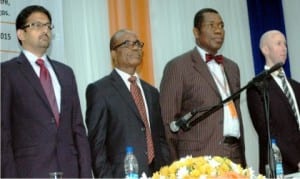Business
Oil Prices Fall As World Bank Cuts Economic Growth Outlook

L-R: Managing Director, GlaxoSmithKline Consumer Nigeria Plc (GSK), Dayanand Thandalam, GSK chairman, Mr Edmund Onuzo, Company Secretary, Uche Uwechia and Finance Director, Jonathan Murray, at the 44th GSK Consumer Nigeria Plc Annual General Meeting in Lagos, yesterday.
Crude oil futures fell yesterday as the World Bank cut its global economic growth forecast, ending a two-day rally triggered by a sharp United States inventory draw down.
In its twice-yearly Global Economic Prospects report, the World Bank predicted the global economy would expand 2.8 per cent this year, below its 3 per cent outlook in January.
The World Bank predicted that India would record the biggest growth of major economies for the first time, ahead of slowing China.
Front-month Brent crude oil prices were down 11 cents to close at $65.59 a barrel while the US crude shed 25 cents to trade at $61.18 a barrel.
“Considering China’s economic slowdown, we lean towards lower prices today (Thursday),” said Daniel Ang, an analyst at Singapore-based Phillip Futures.
In South Korea, the world’s fifth importer of crude oil, the central bank cut its policy rate by 25 basis points to a record-low 1.50 per cent.
The aim was to shield a tottering economy from an outbreak of a deadly respiratory disease.
Despite Asia’s slowing economies, Iraq on Thursday increased its July official selling price for Basra Light crude following strong demand for the grade last month.
Crude prices, however, drew support from a big US stocks drawdown that has boosted the outlook for summer fuel demand.
The US Energy Information Administration reported that crude oil stocks shrank by 6.8 million barrels last week, the largest drop in almost a year.
Prices in North America have been buoyed recently by high gasoline demand for road vehicles as well as low production in Canada as a result of wildfires.
“In Western Canada, crude oil inventories are at their lowest level since October as maintenance shutdowns and wildfires in northern Alberta take their toll on supply,” ANZ bank said.
Transport
Automated Points Concession : FAAN Workers Gave 72hrs To Revise Decisions In PH

Transport
FAAN Announces Pick-Up Points for Go-Cashless Cards

Business
Fidelity Bank To Empower Women With Sustainable Entrepreneurship Skills, HAP2.0
-

 Politics3 days ago
Politics3 days agoSenate Urges Tinubu To Sack CAC Boss
-

 News3 days ago
News3 days agoAmend Constitution To Accommodate State Police, Tinubu Tells Senators
-

 News3 days ago
News3 days agoDisu Takes Over As New IGP …Declares Total War On Corruption, Impunity
-
Business4 days ago
Crisis Response: EU-project Delivers New Vet. Clinic To Katsina Govt.
-
Business4 days ago
President Tinubu Extends Raw Shea Nuts Export Ban To 2027
-
Business4 days ago
President Tinubu Approves Extension Ban On Raw Shea Nut Export
-
Business4 days ago
Fidelity Bank To Empower Women With Sustainable Entrepreneurship Skills, HAP2.0
-
Sports4 days ago
NDG: Rivers Coach Appeal To NDDC In Talent Discovery

